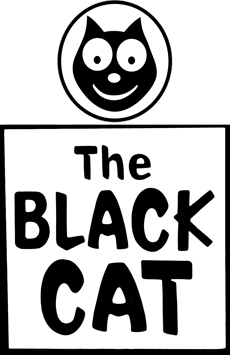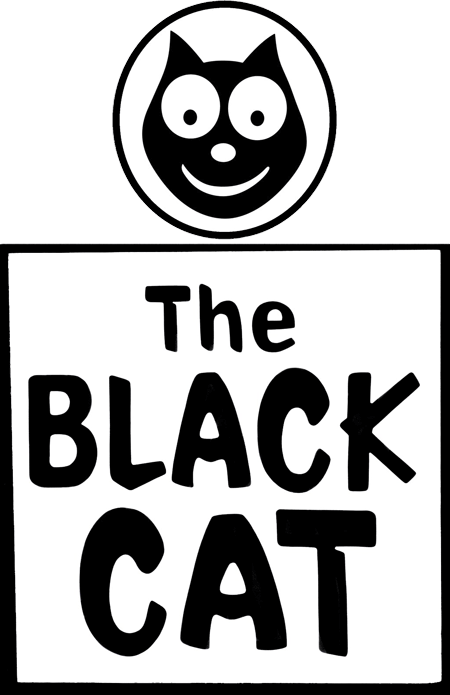
The Black Cat | Silver Lake
Address and Hours
View The Black Cat at 3909 W Sunset Boulevard,
Los Angeles, CA 90029 on Google Maps
Call The Black Cat by phone at
(323) 661-6369
info@theblackcatla.com
We are a 21 & over establishment (no kittens please)
HOURS
Monday - Friday
4:00 PM - 2:00 AM
Saturday & Sunday
2:00 PM - 2:00 AM
Happy Hour from 4:00 PM - 6:00 PM on weekdays
Our kitchen is open until 11:00 PM nightly
Our patio is open until 10:30 PM nightly
Reservations are accepted but not required
For parties up to 9 guests please select the reservation button below
For parties of 10 or more please email: reservation@theblackcatla.com
E-Gift Card
Book An Event
For event inquiries in our private event room, please fill out the form below and we’ll be in touch soon. For full venue buyouts and filming inquiries, please email here.
The Back Cat
The Back Cat at The Black Cat is a private dining and event space that can accommodate afternoon and evening dinner parties from 12 to 30 guests, and up to 40 guests for cocktail parties, receptions and screenings.
- Capacity Up to 30 for dinner | up to 40 for receptions and screenings
Black Cat Tavern 1967
Historic Cultural Monument
-
Images courtesy of ONE National Gay & Lesbian Archives at the USC Libraries
Images courtesy of ONE National Gay & Lesbian Archives at the USC Libraries
Images courtesy of ONE National Gay & Lesbian Archives at the USC Libraries
The Black Cat. A Brief History.
The Black Cat Tavern opened in October 1966 catering to a gay clientele. At that time, homosexuality was medically classified as a mental illness, same-sex relations were criminalized in California, and in Los Angeles, the LGBTQ community faced constant intimadation, harassment and violent oppression at the hands of the Los Angeles Police Department.
On New Year’s Eve 1967, The Black Cat was targeted in an undercover police sting. As the crowd celebrated at midnight, a dozen plainclothes police officers began their raid on the unsuspecting revelers. The frightened patrons and staff fought back against the unannounced officers. It was a confusing scene that quickly devolved into chaos as all resistance was met with brutal police force. In all, fourteen people were beaten to the floor, dragged outside, and arrested on the sidewalk in front of the bar. Three weeks later, six of those detained were brought to trial by jury to face charges of lewd conduct. All six were found guilty of the act of same-sex kissing, a conviction that carried a penalty which required them to publicly register as sex offenders for life.
In the wake of these unjust events, a coalition of LGBTQ community members joined forces with a burgeoning local activist organization named Personal Rights in Defense and Education (PRIDE) to plan a demonstration outside The Black Cat. Held on February 11, 1967, the event was attended by several hundred brave people. They were met on the street by squadrons of armed riot police officers. Despite this show of force, the disciplined demonstrators remained orderly. The protest unfolded tensely, but peacefully.
Predating the Stonewall uprising in New York by two full years, the 1967 Black Cat demonstration marks one of the first moments in US history that the LGBTQ community organized publicly to protest the harassment, brutality, and persecution they were suffering at the hands of the state for being queer.
Soon after, Charles Talley and Benny Baker (two of the six men convicted of lewd conduct) would appeal their convictions to the United States Supreme Court. The high court declined to take up their appeal. Nonetheless, the case set a legal precedent that would transform the social, cultural, and political tenor of the LGBTQ civil rights movement from that moment on. Their appeal asserted (for the first time) that sexual orientation should not preclude someone from enjoying the same rights and equal protections guaranteed to all Americans under the 14th Amendment of the U.S. Constitution.
In 2007, The Black Cat was recognized by the Los Angeles Cultural Heritage Commission as Historic-Cultural Monument #939. A commemorative plaque on the façade of the building honors The Black Cat as the site of the first documented LGBTQ civil rights demonstration in the nation.
In 2022, the State of California designated The Black Cat Historical Landmark #1063, the first and only California Historical Landmark to recognize California's LGBTQ history. A commemorative plaque on the corner of Sunset and Hyperion marks the monumental civil and human rights history of the location.
purchase e-gift card


